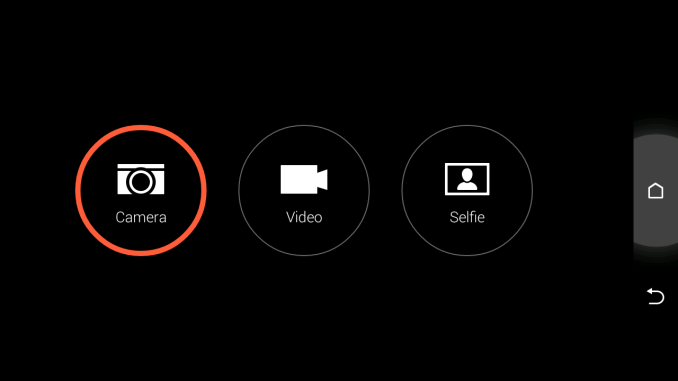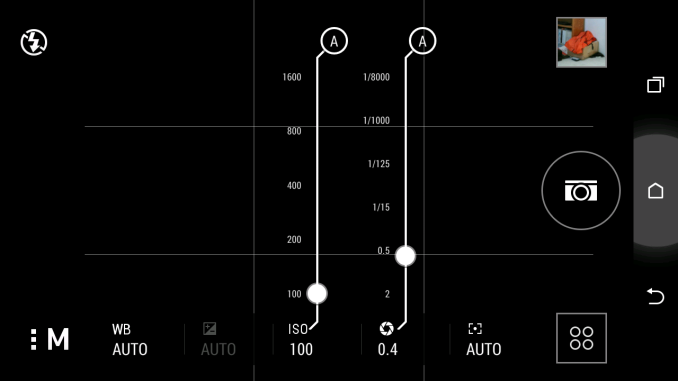HTC One mini 2 Review
by Anand Lal Shimpi & Joshua Ho on May 26, 2014 3:00 AM EST- Posted in
- Smartphones
- HTC
- Mobile
- One mini 2
Camera Architecture
This go around, HTC put a 13 megapixel camera into the One mini 2. This in a vacuum wouldn’t be anything out of the ordinary, but in the context of the past year it’s well worth examining. After all, HTC kept the same ST VD6869 sensor across the One (M7) and One mini, and also continued to use a similar 4 megapixel camera in the form of the OV4688. Especially in light of all the rhetoric that HTC has pushed in favor of larger pixel sizes in marketing literature, it’s worth examining the camera of the One mini 2 closely.
| HTC One Cameras | ||||
| HTC One mini 2 | HTC One (M8) | |||
| Front Camera | 5.0MP | 5.0MP | ||
| Front Camera - Sensor |
S5K5E2 (1.12µm, 1/5") |
S5K5E2 (1.12µm, 1/5") |
||
| Front Camera - Focal Length | 2.79mm | 1.83mm | ||
| Front Camera - Max Aperture | F/2.8 | F/2.0 | ||
| Rear Camera - Sensor |
OV13850 (1.12 µm, 1/3.06") |
OV4688 (2.0 µm, 1/3") |
||
| Rear Camera - Focal Length | 3.82mm (28mm eff) | 3.82mm (28mm eff) | ||
| Rear Camera - Max Aperture | F/2.2 | F/2.0 | ||
| Secondary Rear Camera - Sensor | - |
OV2722 (1.4µm, 1/5.8") |
||
As can be seen in the table above, the same front facing camera sensor is shared by both the One mini 2 and One (M8), which is a Samsung sensor with 1.12 micron pixel size although the optical stack changes to reduce aperture size and increase focal length. The rear sensor on the One mini 2 is still an OmniVision design win, but the sensor model is the OV13850 as opposed OV4688 on the One (M8) and later production runs of the One (M7). While the sensor size is the same, as is the optics’ focal length, the differences end there as the One mini 2 has a smaller aperture at F/2.2, which is a quarter stop smaller, which means that light collection goes down as well. The lack of the second depth sensing camera also means that all of the Duocam effects such as UFocus are gone as well, which means that the One mini 2’s editing features are equivalent to the One (M7)’s.
Outside of hardware, the change in ISP is far-reaching in its effects. Zoe, Pan 360, and Dual Capture are all gone, which suggests that the ISP in the MSM8x26 series cannot support dual encode features the way that the ISP in the MSM8x74 series can. Video encoding is also severely limited as the One mini 2 only supports a maximum of 720p60 or 1080p30. This is clearly not a limitation of the camera sensor as casual examination of the OV13850’s data sheet shows that it can record data from the entire sensor at 30fps. This means that the encode blocks don’t support the necessary bandwidth for such features. It's also interesting to see that HTC has capped the maximum shutter speed in the camera to two seconds rather than four seconds in the One (M8).
In addition to these issues, the shooting experience is noticeably worse. Preview resolution and frame rate are worse than the One (M8), and it seems that autofocus speed drops as well. Shot to shot latency and burst shot capture rate both are much slower, and I suspect that this is either the product of worse random read and write speeds on the NAND or a bottleneck at the ISP. Overall then, this means that comparing the performance of the One (M8) and One mini 2 in camera will be difficult as they can be confounding factors upon camera image quality.












76 Comments
View All Comments
beardybuck - Wednesday, May 28, 2014 - link
I just cannot understand why the Z1 Compact isn't even mentioned in reviews?Okay, I understand that as a US site the penetration of Sony is considerably less than other markets, but as an enthusiast site, it surely merits some reference?
fokka - Wednesday, May 28, 2014 - link
this article, especially the conclusion, sums up my thoughts about the mini 2 nicely. for what you get it's just priced too high and for what it should be, it just makes too many compromises.i would be extremely interested in a smaller flagship phone and think the design of the m7/m8/mini2 is second to none. but the m7 lacks expandable storage (i just ordered a 128gb sandisk...), the m8 is just too big for my taste and needs and the mini 2 has its own set of problems, as we can clearly see.
it's still a very nice phone, but for me it is too compromised (1gb of ram? really??) and much too expensive.
also, with those internals it has no right to be about the same size as the m7, plus htc would have done good if it would have implemented optional capacitive buttons on the black bar, like the 1+1. at least then we would have more available space on-screen.
AnnonymousCoward - Wednesday, May 28, 2014 - link
Why the heck did you measure camera shot time, instead of the IOPS transferring then? I mean that's your SSD measurement strategy. Just give a graph of IOPS for each model.Archipelago - Thursday, May 29, 2014 - link
I too just do not understand the lure of metal and faux metallic cellphones. Quality plastic (such as the Lumias polycarbonite) is cheaper and better and probably tougher.jnkweaver - Sunday, June 1, 2014 - link
How do you do a smartphone review and not even mention call quality? I can find no mention of using it as a phone.RDR99 - Friday, May 15, 2015 - link
I am voting with my feet .. after using HTC since their first smartphone, the HTC Mini 2 really disappointed me and HTC refused to admit that the Mini 2 is totally crippled and underpowered as a phone .. but after trying to use it for over 3 months I had enough .. recently I have delays of 15-20 seconds switching apps .. turning on the phone .. and it keeps freezing .. uninstalled loads of apps .. same result ..So .. HTC Mini 2 is such a bad phone that I just changed to a Sony Z3 compact, after switching to Sony for my Tablet (from a Samsung Note 2 which also was as slow as a crippled dog) and have been incredibly impressed by both products that all I have to say is ... Bye Bye HTC !!